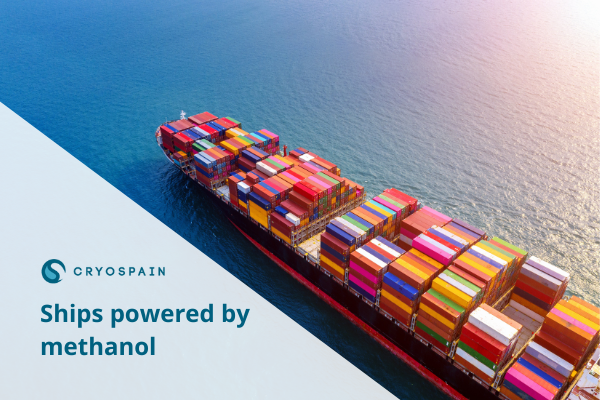Methanol (fuel for ships) has gained a large number of followers in the maritime transport industry, currently engaged in searching for environmentally friendly options.
In the transition from models based on fossil fuels, today there is an ongoing debate in which companies are experimenting with various solutions. Thus, alternatives such as Liquefied Natural Gas (LNG) and other biofuels are also taken into account for the future of the maritime transport industry.
What is methanol, what is a methanol ship, and what are the advantages of this system? In this article we will tell you in detail.
What is methanol and why is it used as a fuel?
Methanol is a chemical substance with great properties for energy transfer, among other characteristics.
The use of methanol gas and its derivatives will lead to the growth of the market associated with this substance: it is expected that the global methanol market will grow from 28.740 billion US dollars in 2021 to $39.180 billion in 2028, maintaining a 4.5% rate of growth according to Fortune Business Insights.
Today, the maritime transport industry has focused on this substance in the search for a solution to the challenges faced at this time.
Specifically, the challenges of the industry can be summarised in two factors:
- Seeking greater sustainability: In looking into alternatives to fossil fuels, some companies, sceptical with regard to LNG as a solution, have opted for methanol.
This is the case of Danish company Maersk, which recently announced the construction of eight large ships powered by methanol biofuel.
The achievement of sustainability in maritime transport would constitute an especially significant step, as it contributes a large proportion of emissions derived from global supply chains.
Nevertheless, companies must guarantee that the methanol has not been obtained by environmentally harmful means, and that emissions have been monitored during its production.
- Solution to economic problems: As we describe further on in the article, methanol constitutes a more accessible and less costly chemical than other alternatives.
In this regard, it may help companies to address current and future economic challenges, including the sharp increase in shipping fees currently being dealt with, which may increase import prices by 11% and consumer prices by 1.5% between now and 2023, as forecast by the United Nations.
You might be interested in: Ship Retrofit: two new maritime projects for Cryospain
Ships powered by methanol fuel
Advantages of using methanol
- Avoiding carbon taxes: It is calculated that taxes on diesel may vary between 250 and 450 dollars per tonne of CO2. Companies of the maritime industry which act early and carry out their conversion to methanol fuel or other alternatives will avoid these fees.
- Sustainability: In the case of Maersk, it has announced the that the incorporation of the methanol ship into its system will generate annual CO2 emissions savings of around 1 million tonnes. Another aspect with regard to the sustainability of methanol fuel consists of undertaking a lifecycle analysis, so as to guarantee that it has been produced in a carbon neutral way from renewable sources (for example, from biomass or recycled carbon dioxide). Additionally, methanol is biodegradable and dissolves in water.
- Availability: Methanol is one of the most commonly used chemical substances in the world and is available for bunkering in 88 of the 100 most important ports in the world.

Characteristics of these ships
- A methanol ship can operate for over 60,000 hours using only methanol fuel.
- It is a developing technology. Technological advances with regard to the piping system and injection valves are helping to generate increasingly efficient solutions.
- They allow compliance with the IMO 2020 regulation. Developed by the International Maritime Organization (IMO) to try to reduce the sulphur content of marine fuels by 0.50%. The methanol ship system allows compliance with Level III of IMO 2020 without the need to apply exhaust gases after treatment.
- Versatile engines. Current solutions involve two-stroke engines, which operate with both methanol and fuels for conventional ships.
Related content: LNG Bunkering Stations for shipping
Fuel: Methanol vs LNG
The debate in the maritime industry on which model will be suitable in the energy transition has involved the comparison of these two elements. Thus, some of the key aspects for understanding methanol fuel compared with LNG include:
- Costs: Methanol is described as a more economical solution than LNG and current biofuels, in their current production and commercialisation.
- Infrastructure: The modification of ships for the use of methanol fuel is considered to be easier and cheaper than for LNG and other alternative fuels. Some calculate the cost as being up to 25% less expensive. Thus, in the conversion of a methanol ship, only minimal modifications in storage and bunkering structure are necessary.
- Emissions: Methanol is considered a clean-burning fuel compared with other alternatives, eliminating pollutant emissions. In this regard, methane is not released into the atmosphere, in contrast to burning LNG.
- Supply: Methanol is easily available in comparison with LNG and comes from renewable sources.
At Cryospain we want to offer you all of our experience and service capacity to provide solutions to ships and vessels which need these types of propulsion, both for methanol and LNG, as we are experts in pipe-in-pipe systems.
If you have any queries, don’t hesitate to contact us!











 Contacte-nos
Contacte-nos